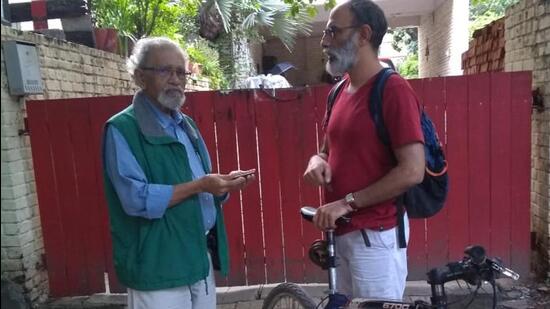Sujit Patwardhan was a great mentor, source of enormous information: Ranjit Gadgil
Parking is a poorly understood subject, even by those in the field for years, but Patwardhan intuitively grasped the importance of this tool to help control the motorisation rates, says Gadgil
I returned to Pune (my hometown) in 2005, after spending 11 years in the United States, where I first attended graduate school studying astrophysics and then worked as an IT consultant. For someone who wanted to get into the social sector, Pune had plenty to offer. I was introduced to Sujit Patwardhan of Parisar by Maj Gen Jatar.

Parisar was part of the Pune Traffic and Transportation Forum (PTTF), a “super NGO”.
PTTF had recently organised “One Right Turn”, a seminar on sustainable transportation (which was attended by Nitin Kareer, then the municipal commissioner).
The idea of Bus Rapid Transport (BRT) as a low-cost mass transit option was first presented at this seminar. Later Patwardhan managed to get Enriqué Peñelosa, former mayor of Bogota, to Pune to deliver a public lecture. These events shaped the future of Pune on the transport front and Pune became the first city to launch BRT under Jawaharlal Nehru National Urban Renewal Mission, a massive city-modernisation scheme launched by the UPA government.
Pune was also declared one of the most polluted cities by the Supreme Court-appointed Environment Pollution (Prevention and Control) Authority (EPCA) and was required to prepare a comprehensive traffic and transportation policy.
This is the background against which I started my association with Patwardhan and Parisar, first helping to draft the CTTP and then playing an active role in the promotion of ideas like BRT.
I was able to align quickly with the idea of “people-friendly” cities and loved the analytical approach combined with the passion that transport advocacy required. Patwardhan was a great mentor and source of enormous information, be it “Taking Steps” by Paul Barter or “U-turn” a film by BBC that we managed to show every commissioner who took charge in the city.
Parking is a poorly understood subject, even by those in the field for years, but Patwardhan intuitively grasped the importance of this tool to help control the motorisation rates. But perhaps more importantly, he allowed someone much younger (his daughter’s age) to be an equal partner in the organisation thus paving the way for my journey on this path.
Sujit’s work in the field of sustainable transport and environmental movements is well known. Also, Pune has one of the strongest groups of young civil society activists in the field of sustainable transportation. We collectively owe this to Patwardhan. And while he is gone - too soon - this is his lasting legacy to the city he so loved.
(Ranjit Gadgil is the programme director of Parisar)





